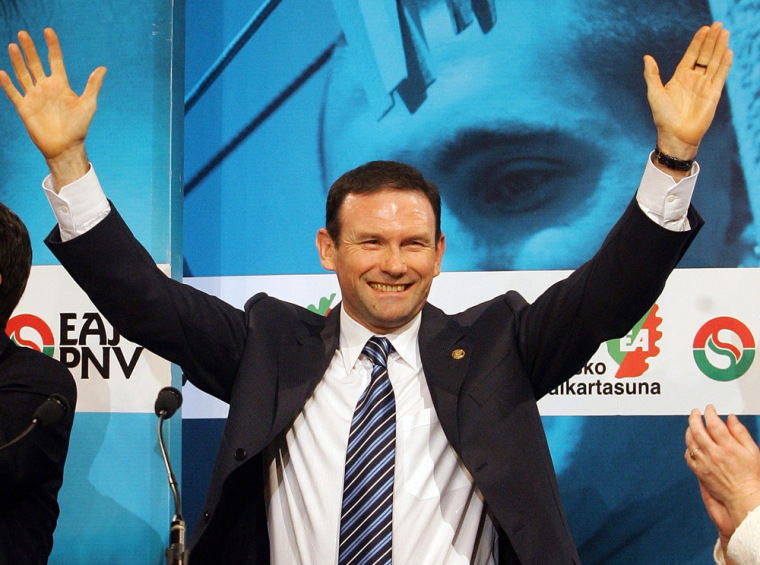Ruling Basque nationalists pushing for more autonomy from Spain won a key regional election Sunday but fell short of a majority, losing seats as candidates backed by a banned pro-independence party drew unexpectedly high support, according to government figures.
The wealthy three-province region in northern Spain has had broad self-rule for 25 years, and the incumbent president Juan Jose Ibarretxe was seeking enough voter support to pressure Madrid to negotiate on his plan for Basque autonomy bordering on independence.
But with 100 percent of the votes counted, his Basque Nationalist Party and a moderate ally won 29 seats in the 75-member Basque legislature, well short of the 38 needed for an outright majority and down from 33 in the outgoing parliament, the Basque Interior Ministry said.
An obscure pro-independence party endorsed by Batasuna, the party seen as the political wing of the armed Basque separatist group ETA, won nine seats. It outperformed even Batasuna, which had seven seats in the outgoing legislature before being banned for the first time in a Basque election.
ETA has been blamed for more than 800 deaths since the late 1960s in its campaign for an independent Basque homeland in land straddling northern Spain and southwest France.
Ibarretxe played up a win that appeared bittersweet at best. “We won the confidence of Basque society, which thinks we have the key to advancing this country, for there to be negotiations so it can decide for itself,” he told supporters.
‘The big surprise’
The pro-independence party reveled in its unexpected win. “During the campaign we said we would be the big surprise and that’s how it turned out,” said Maite Aranburu, a candidate for the Communist Party of the Basque Lands, which was formed just three years ago and had no seats in the last legislature. It was endorsed by Batasuna and pointedly refuses to condemn ETA violence.
Xavier Lapitz, a political analyst for Basque public radio, attributed the Communist party’s strong results to a backlash against the banning of Batasuna and a court ruling last month that disqualified yet another pro-independence party on grounds it was a sanitized continuation of Batasuna.
“The pressure of the bans energized the Batasuna electorate,” he told The Associated Press.
Kepa Aulestia, a former ETA member who is now a political analyst, said the election results heralded a “radicalization” of Basque politics.
The Basque branch of Prime Minister Jose Luis Rodriguez Zapatero’s Socialists unseated the conservative Popular Party as the second most-voted party in the region, rising from 13 seats to 18. The conservatives dropped from 19 to 15.
Both parties oppose Ibarretxe’s plan, which calls for a separate court system, representation in international bodies such as the European Union, and the right to secede from Spain — which the Spanish constitution bars.
‘No future’
Zapatero maintains that Ibarretxe’s proposal “has no future.” He has proposed granting the Basques some new powers, but only through a broad consensus in the region.
Zapatero’s Socialists and the conservative opposition Popular Party say Ibarretxe is trying to break Spain apart. Zapatero’s party had hoped to lure votes away from Ibarretxe’s moderate Basque Nationalist Party.
Ibarretxe says a key condition for a referendum is a halt to violence by ETA.
Ibarretxe’s plan, narrowly passed by Basque lawmakers late last year, was quickly rejected by the Spanish parliament in Madrid. Sunday’s vote was touted as its first popular test.
